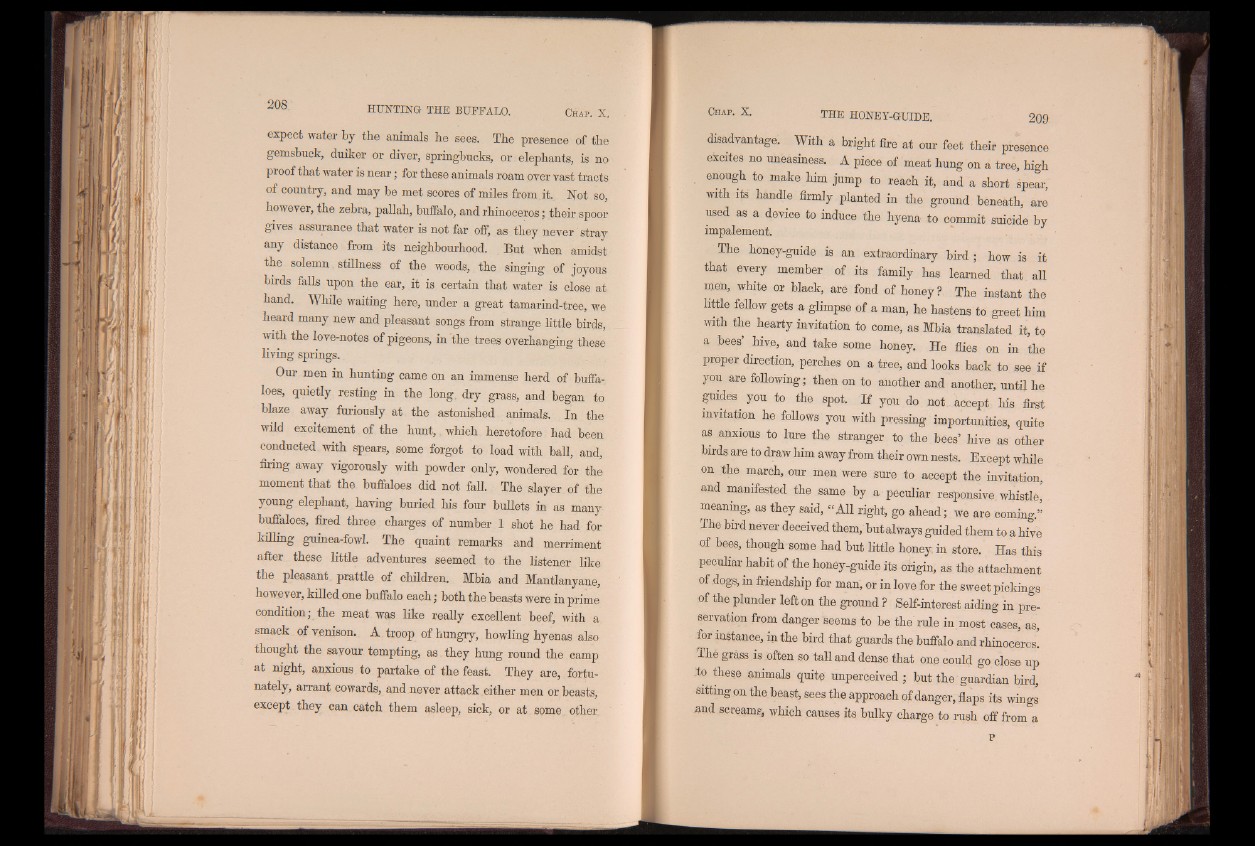
expect water by the animals be sees. Tbe presence of the
gemsbuck, duiker or diver, springbucks, or elephants, is no
proof that water is near; for these animals roam over vast tracts
of country, and may be met scores of miles from it. Not so,
however, the zebra, pallah, buffalo, and rhinoceros; their spoor
gives assurance that water is not far off, as they never stray
any distance from its neighbourhood. But when amidst
the solemn stillness of the woods, the singing 0f joyous
birds falls upon the ear, it is certain that water is close at
hand. While waiting here, under a great tamarind-tree, we
heard many new and pleasant songs from strange little birds,
with the love-notes of pigeons, in the trees overhanging these
living springs.
Our men in hunting came on an immense herd of buffaloes,
quietly resting in the long, dry grass, and began to
blaze away furiously at the astonished animals. In the
wild excitement of the hunt, which heretofore had been
conducted with spears, some forgot to load with ball, and,
firing away vigorously with powder only, wondered for the
moment that the buffaloes did not fall. The slayer of the
young elephant, having buried his four bullets in as many
buffaloes, fired three charges of number I shot he had for
killing guinea-fowl. The quaint remarks and merriment
after these little adventures seemed to the listener like
the pleasant prattle of children. Mbia and Mantlanyane,
howe.vei, killed one buffalo each; both the beasts were in prime
condition; the meat was like really excellent beef, with a
smack of venison. A troop of hungry, howling hyenas also
thought the savour tempting, as they hung round the camp
at night, anxious to partake of the feast. They are, fortunately,
arrant cowards, and never attack either men or beasts,
except they can catch them asleep, sick, or at some other
disadvantage. With a bright fire at our feet their presence
excites no uneasiness. A piece of meat hung on a tree, high
enough to make him jump to reach it, and a short spear,
with its handle firmly planted in the ground beneath, are
used as a device to induce the hyena to commit suicide by
impalement.
The honey-guide is an extraordinary bird ; how is it
that every member of its family has learned that all
men, white or black, are fond of honey? The instant the
little fellow gets a glimpse of a man, he hastens to greet him
with the hearty invitation to come, as Mbia'translated it, to
a bees’ hive, and take some honey. He flies on in the
proper direction, perches on a tree, and looks back to see if
you are following; then on to another and another, until he
guides jj you to the spot. If you do not accept his first
invitation he follows you with pressing importunities, quite
as anxious to lure the stranger to the bees’ hive as other
birds are to draw him away from their own nests. Except while
on the march, our men were sure to accept the invitation,
and manifested the same by a peculiar responsive, whistle,
meaning, as they said, “AH right, go ahead; we are coming.’’
The bird never deceived them, butalways guided them to a hive
-of bees, though some had but little honey in store. Has this
peculiar habit of the honey-guide its Origin, as the attachment
of dogs, in friendship for man, or in love for the sweet pickings
of the plunder left on the ground ? Self-interest aiding in preservation
from danger seems to be the rule in most cases, as,
for instance, in the bird that guards the buffalo and rhinoceros!
The grass is often so tall and dense that one could go close up
-to these animals quite unperceived; but the guardian bird,
sitting on the beast, sees the approach of danger, flaps its wings
And screams, which pauses its bulky charge to rash off from a